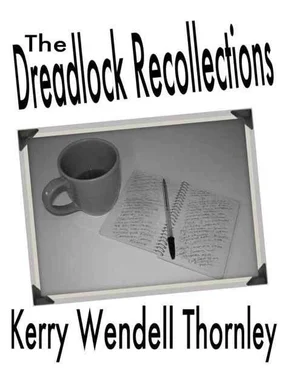We also read in The Family (p. 73) that Sharon Tate was initiated into witchcraft by a disciple of Aleister Crowley, who was technical adviser on the set of a horror movie she made in London, and that San Francisco Satanist Anton LaVey played the role of the Devil in Rosemary's Baby . (p. 77)
And we also read of Miss Tate that in 1966 "her father, Lieutenant Colonel Paul Tate, was doing his thing in Vietnam, capping a career in army intelligence." (p. 76)
Without the context of Brother-in-law's strange fascinations for both Satanism and military intelligence matters, such circumstantial oddities don't take on much significance. But Sanders makes a further observation that lends more weight to any hypothesis for investigation that might arise from these disturbing hints.
"It is possible that the Process had a baleful influence on Sirhan Sirhan since Sirhan is known, in the spring of '68, to have frequented clubs in Hollywood in the same turf as the Process was proselytizing. Sirhan was very involved in occult pursuits. He has talked several times subsequent to Robert Kennedy's death about an occult group from London which he knew about and which he really wanted to go to London to see."
And Process headquarters just happens to be in London, where they broke off from the local Scientology chapter the year President Kennedy was assassinated.
"There was one Process member named Lloyd who was working as a chef for one of the large Los Angeles hotels, either the Ambassador or the Sheraton. Lloyd was around fifty years old" and seems to have belonged to the branch of The Process called Jehovans.
"It is probably a coincidence that Sirhan seems to have visited a friend who worked in the kitchen of the Ambassador Hotel the day before he shot Senator Kennedy." (pp. 95–96)
Possibly, as paranoid as it may seem, it was not a coincidence. Could the Polanskis have been somehow involved in the conspiracy to murder Robert Kennedy? Many people with relatives or close friends in Communist bloc countries are perforce involved with the intelligence community, as may have been true of Roman Polanski, for if they don't follow orders, their loved ones in the old country are at the mercy of the secret police. And for that reason many join organizations consisting of exiles bent on liberating the homeland from Marxist rule.
Might the Tate killings have been a revenge crime for the assassination of Robert Kennedy? Might the murderers have been motivated at a more clandestine level by instigators working both sides of the fence? They would have been in a position to blackmail anyone conspiring with Manson or his followers, putting a contract out on Sharon Tate and her friends.
A somewhat far-fetched hypothesis, I grant you, but those are the kinds of notions about the disturbing links that kept occurring to me, sometimes in the form of nightmares.
Particularly since counter-cultural writer and publisher Paul Krassner was also announcing that his personal investigations had turned up numerous links between the Manson crowd, military intelligence, and the Kennedy assassinations, they were not possibilities I could easily dismiss, especially in light of what I was now learning about standard operating procedures in secret society combat within the intelligence community.
By the middle of 1976, it had become obvious to me in a thousand ways that my efforts to unravel the central mystery of my own life had attracted more than ample attention from someone. I could no longer afford the luxury of not thinking about Slim's brother-in-law and equally bizarre matters, as much as I would rather have been contemplating absolutely any other subject instead.
As a result I have permitted my mind to wander to the opposite extreme, that of endeavoring to remember everything about that unusual man, no matter how repulsive or insignificant, of allowing him to become the major focus of my thoughts, an individual I once found so boring and tedious that I actually wondered if he might not be prematurely senile.
Now and again I have received help from the mysterious forces that surround me in order to keep tabs on my actions. A key phrase mentioned by a stranger passing me on the street will trigger additional recollections about a conversation recorded incompletely in past notes, and I have been scribbling a constant stream of notes every day for years.
Sometimes I will discuss the case with a comparative stranger who, without admitting to inside knowledge, will ask a question so pointed as to appear quite well informed. Many is the time such a question renewed memory of another long-forgotten chat with Brother-in-law.
During the first visit to his new house, Gary asked me what seemed like an academic question: "Kerry, if one man saves the life of another man, would you agree with the notion that the first man then has the right to do whatever he wants with the life of the man he has saved?"
"I don't know," I shrugged, "but I read where the Chinese believe that if you save another man's life, then from that day forward you are to blame for any crimes he commits."
At the beginning of the next visit, he said: "I'm interested in further discussing your opinion of this matter about one man saving the life of another man, Kerry. Now tell me: What would you say? Does the man who saves the life have the right to do whatever he wants with the life he has saved? Or not?"
I could not begin to imagine what possible difference my answer would make. "Yeah, I guess so," I finally said.
One of the first chats with Brother-in-law at his house centered around his projected book, Hitler Was A Good Guy , a name I loved for its shock value, but which Gary took pains to remind me was "only a working title."
"The secret to Hitler's power was that he had no power," he explained. "He was instead surrounded by powerful men, men with branches of the military, labor unions, police bureaus, organized criminal gangs at their commands. But he himself had no such direct base of power. He was a great orator who had written a book, but he possessed no direct access to a single organization. The Nazi Party was an alliance of the organizations under the men around him. Hitler was their compromise candidate because they could trust him when they could not trust one another, and they trusted him only because he had no power of his own. And that's why he was powerful. Many of the others held views much more extreme than his, but they didn't trust one another directly so they couldn't do anything about them."
A nonchalantly pedantic attitude dominated his mercurial personality as he spoke.
"I'm going to write a fictionalized chapter, a projection of what would have happened, if Martin Bormann had pulled a coup and taken over in Hitler's place, another chapter about what would have happened with Himmler in Hitler's shoes, and another one about Rosenberg. Now he was a beauty, he used to have anyone with the name 'Rosenberg' executed as soon as his troops took over a town. He was also the one who formulated the precepts of the Nazi religion, which has certain features to recommend it, incidentally."
I sat there not knowing how to react. I just didn't know how to take this guy.
"Hess was a stupid one. Literally of below average I.Q., he's the guy who parachuted into England to try to get the British to join the Germans, as Hitler, because of his racial theories, at first thought they would. Hess made that move on the advice of his astrologer. All the English did was put him in prison. He's rotting there to this day," he smirked. "Very unfair of them."
A mixture of horror and intellectual fascination left me in a state resembling paralysis.
"And when Himmler found out why Hess did it, he rounded up all the astrologers and killed them, including Hitler's astrologer, and Hitler got pissed off about that. God, was he ever pissed! Heh-heh."
Читать дальше












